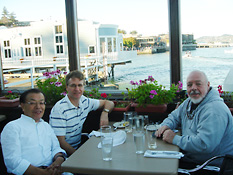
堀田 優子 (HORITA Yuko) 教授
【研究領域】 認知言語学、構文文法、意味論堀田優子教授のサイトはこちらから |
渋谷 良方(SHIBUYA Yoshikata) 准教授
【研究領域】 英語学、認知言語学、構文文法、コーパス言語学渋谷良方准教授のサイトはこちらから |
宮澤 優樹(MIYAZAWA Yuki) 講師
【研究領域】 英米文学宮澤優樹講師のサイトはこちらから |
退職された先生方
高田 茂樹 (TAKADA Shigeki) 教授
【研究領域】 シェークスピアなどイギリス・ルネッサンスの文化 |
和泉 邦子 (IZUMI Kuniko) 教授
【研究領域】 英語学英米文学 |
小原 文衛 (KOHARA Bunei) 准教授(準専任)
【研究領域】 米英怪奇小説の精神分析学的読解、批評理論 |
中村 芳久 (NAKAMURA Yoshihisa) 教授
【研究領域】 英語の認知的研究 |
【経歴】 1951年7月23日生まれ(福岡県大川市)1980年3月 : 九州大学文学研究科英語英米文学専攻博士課程単位取得退学 1980年3月 : 島根大学法文学部着任 1985年8月 : ワシントン州立セントラルワシントン大学客員教授(翌年8月まで島根大学と併任) 1988年4月 : 金沢大学文学部・文学研究科着任 【2011年以降の活動】 3月 : 博士号取得7月 : 国際認知言語学会発表(中国西安) 10月 : 「科学と非二元論学会」発表(米国サンラファエル) 11月 : 日本英語学会シンポジウム『主観性の諸相』(司会・発表、新潟大学) 12月 : 札幌大学大学院講演 2012年 2月 : 金沢大学人間社会研究域特定研究シンポジウム発表 3月 : (間)主観性研究フォーラムin仙台を主催『ラネカーの視点構図と(間)主観性』 (司会・発表・鼎談、東北大学) |

2011年10月学会のあとSFの桟橋のレストランにて。外国人教師Rickとその友人Johnと。
村上 清敏 (MURAKAMI Kiyotoshi) 教授(準専任)
【研究領域】 19世紀アメリカ文学、アメリカを中心とした環境文学 |
EDWARDS PETER ANTHONY HUGH (エドワズ(ピーターアンソニー) ヒユー) 教授(準専任)
【研究領域】 Late medieval and nineteenth century literature, works on aesthetics, and recent novels【外国人教師からあなたへ 】 University Education is a New Beginning. Peter Anthony Huge EdwardsA university education may serve many individual purposes. It may improve one's chance of embarking on an interesting career. It may provide with a period of time and circumstances in which to take up fresh activities, from new kinds of personal relationships and experiments with life, as well as to continue to cultivate already established talents. Less ambitiously, going to university can also be used as a way of ‘killing’four years of one's life before the obligations of work and family life are shouldered. However, if one intends to derive the utmost from a university education, none of the above purpose will be lie at the heart of one's concerns. Each person who enters university has spent long periods studying, acquiring skills and especially learning by heart many ‘facts’ in order to pass entrance and other examinations. Everyone in well-acquainted with the pressures that stem from diverse sources. University education does indeed require much preparation, but it should be also be the beginning of something which may have played far less of a role in one's schooling. Most profit is derived from one's university years if it is viewed neither as mere consolidation nor as a complete break with education received at school. It is vital to learn to think for oneself. A rule of thumb, so one that admits the occasional exception, and can be applied broadly in life, deserves to be acted on in education. I mean ‘education’ in a broad sense. ‘Training’ is an important part, but only a part of education. The rule is that, ‘if you want to know where you are going and understand correctly why you are going there - as one advances, keep an eye on what one is leaving behind.’ In education, this caution is not born of fear - as is usual in politics and warfare. It simply pays respect to the ‘progressive’ or ‘integrating’ requirements of so much human knowledge and understanding. We are not indefinitely malleable, and so some of the limits to what we can become have been set by what and where we have been. Understanding these and other limits often makes our choices for the future less like stabs in the dark. Gaining greater understanding of and so in the world is a co-operative venture. It demands that we be prepared to ask others where and when we ourselves would otherwise remain in a benighted state. Kikuwa ittokino haji, kikanuwa matudaino haji. Then, and only then, will we begin to feel, not only the impulse to think for ourselves, but feel that we are gaining some justification for the ever-vulnerable confidence which thinking for ourselves requires. |
Copyright©2011 Kanazawa University., All rights reserved.





